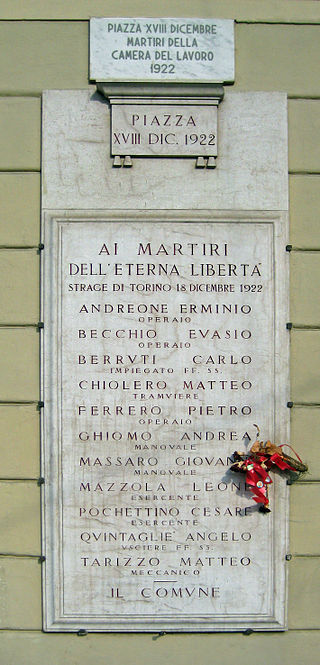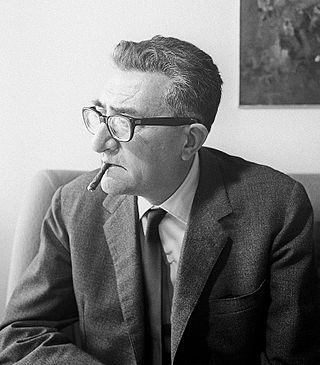
Antonio Francesco Gramsci was an Italian Marxist philosopher, linguist, journalist, writer, and politician. He wrote on philosophy, political theory, sociology, history, and linguistics. He was a founding member and one-time leader of the Italian Communist Party. A vocal critic of Benito Mussolini and fascism, he was imprisoned in 1926, where he remained until his death in 1937.

The Italian Communist Party was a communist and democratic socialist political party in Italy. It was founded in Livorno as the Communist Party of Italy on 21 January 1921, when it seceded from the Italian Socialist Party (PSI), under the leadership of Amadeo Bordiga, Antonio Gramsci, and Nicola Bombacci. Outlawed during the Italian fascist regime, the party continued to operate underground and played a major role in the Italian resistance movement. The party's peaceful and national road to socialism, or the Italian road to socialism, the realisation of the communist project through democracy, repudiating the use of violence and applying the Constitution of Italy in all its parts, a strategy inaugurated under Palmiro Togliatti but that some date back to Gramsci, would become the leitmotif of the party's history.

Palmiro Michele Nicola Togliatti was an Italian politician and statesman, leader of Italy's Communist party for nearly forty years, from 1927 until his death. Born into a middle-class family, Togliatti received an education in law at the University of Turin, later served as an officer and was wounded in World War I, and became a tutor. Described as "severe in approach but extremely popular among the Communist base" and "a hero of his time, capable of courageous personal feats", his supporters gave him the nickname il Migliore. In 1930, Togliatti renounced Italian citizenship, and he became a citizen of the Soviet Union. Upon his death, Togliatti had a Soviet city named after him. Considered one of the founding fathers of the Italian Republic, he led Italy's Communist party from a few thousand members in 1943 to two million members in 1946.

Luigi Longo, also known as Gallo, was an Italian communist politician and general secretary of the Italian Communist Party from 1964 to 1972. He was also the first foreigner to be awarded an Order of Lenin.

Arditi was the name adopted by a Royal Italian Army elite special force of World War I. They and the opposing German Stormtroopers were the first modern shock troops, and they have been called "the most feared corps by opposing armies".

The Biennio Rosso was a two-year period, between 1919 and 1920, of intense social conflict in Italy, following the First World War. The revolutionary period was followed by the violent reaction of the fascist blackshirts militia and eventually by the March on Rome of Benito Mussolini in 1922.

Amerigo Dumini was an American-born Italian fascist hitman who led the group responsible for the 1924 assassination of Unitary Socialist Party leader Giacomo Matteotti.

The Kingdom of Italy witnessed significant widespread civil unrest and political strife in the aftermath of World War I and the rise of the far-right Fascist movement led by Benito Mussolini which opposed the rise of the international left, especially the far-left along with others who opposed Fascism.

The 1922 Turin massacre refers to the attack by Italian Fascists against members of a local labour movement in Turin in Italy. Over three days starting on 18 December and ending on 20 December 1922, at least 11 workers were killed in a terror campaign to break the resistance to Fascism by the labour movement and working class.

Count Antonio Graziadei, also known as Tonio, was an Italian academic and politician. One of the co-founders of the Italian Communist Party, he was Professor of Political Economy at the Universities of Cagliari and Parma and a member of the Italian Parliament from 1910 to 1926. In 1928 he went on a self-imposed exile to France to escape fascism. After the war he began his teaching activity at the University of Rome.
Alberto Acquacalda was an Italian anarchist and communist. He was a member of the anti-fascist militant group Arditi del Popolo. He was assassinated by fascist blackshirts at the age of 23.

Riccardo Lombardi was an Italian politician.
Events from the year 1921 in Italy.

The Red Guards, also known as Proletarian Defense Formations, were a paramilitary organization affiliated with the Italian Socialist Party (PSI) and later the Communist Party of Italy (PCdI) during the Red Biennium of the Kingdom of Italy.
Guido Picelli was an Italian anti-fascist, politician and soldier. He was a founding member of the Arditi del Popolo and a participant in the Spanish Civil War where he died in battle.

Argo Secondari was an Italian anarchist and militant anti-fascist and one of the founders of the anti-fascist group Arditi del Popolo.
The Parma Barricades, also known as the siege of Parma, were a series of battles between anti-fascist forces of the Arditi del Popolo and the Proletarian Defense Formations against the fascist Squadristi in August 1922.
The anarchist brigades of the Italian Resistance were active during the Second World War, especially in central and northern Italy.
The Lucetti Battalion was an anarchist partisan brigade that operated in the surroundings of Carrara.

Antonio Cieri was an Italian anarchist and anti-fascist militant. A founding member of the Arditi del Popolo, he fought and died during the Spanish Civil War.

















